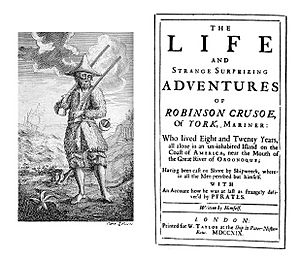Robinson Crusoe facts for kids

Title page from the first edition
|
|
| Author | Daniel Defoe |
|---|---|
| Illustrator | Single engraving by John Clark and John Pine after design by unknown artist |
| Country | United Kingdom |
| Language | English |
| Genre | adventure, historical fiction |
| Publisher | W. Taylor |
|
Publication date
|
25 April 1719 |
| Followed by | The Farther Adventures of Robinson Crusoe |
Robinson Crusoe is a famous novel written by Daniel Defoe. It was first published a long time ago, on April 25, 1719.
The book tells the exciting story of a character named Robinson Crusoe. He leaves his home in England to go on a sea adventure. But his ship gets into trouble and he becomes a castaway.
Crusoe ends up all alone on a faraway tropical island. This island is near Trinidad. He spends many years there, learning to survive by himself.
During his time on the island, he meets different people. These include people who eat other people (sometimes called cannibals), people who are held captive, and even pirates. Eventually, he finds a way to be rescued.
When the book first came out, Daniel Defoe pretended it was a true story. He said that Robinson Crusoe was a real person. Defoe even said he was just the editor of Crusoe's own story. Because of this, many readers believed the book was a true adventure.
Contents
Inspiration for the Story
Many people think the story of Robinson Crusoe was inspired by a real person. This person was Alexander Selkirk. He was a Scottish sailor who was stranded on a Pacific island for more than four years.
This island belonged to Chile. In 1966, the island was even renamed Robinson Crusoe Island!
There might have been other ideas for the story too. An older novel called Hayy ibn Yaqdhan by Ibn Tufail also takes place on a desert island. This book might have given Defoe some ideas.
Another possible inspiration was a Spanish sailor named Pedro Luis Serrano. He was said to be stranded for seven or eight years. This happened on a small island in the Caribbean in the 1520s. He had no fresh water and survived by eating sea turtles and birds.
When he returned to Europe, he became very famous. He wrote about his hard times. It is possible Defoe heard his story during his travels.
How People Liked the Book
Robinson Crusoe became very popular right away. In its first year, it was printed four times!
The book is still very popular today. It is one of the most published books in history. Many other stories, movies, and TV shows have been made because of it.
Lasting Impact of Robinson Crusoe
Influence on Language
The book was so popular that the names of the main characters became well-known. These characters are Crusoe and Friday.
For example, during World War II, some people hid in the ruined city of Warsaw. They stayed there for three winter months. When they were rescued, they were called the "Robinson Crusoes of Warsaw."
Influence on Other Stories
Robinson Crusoe was important for a type of writing called realistic fiction. Its success led to many other books about castaways. These stories became very popular in Europe.
Most of these other books are not well-known today. But some became famous, like The Swiss Family Robinson. This book even used Crusoe's first name in its title.
Jonathan Swift's book, Gulliver's Travels, came out seven years after Robinson Crusoe. Some people think it was written to show a different view of human abilities.
In Treasure Island, the author Robert Louis Stevenson made a character like Crusoe. This character is Ben Gunn. He is a friendly castaway who has been stranded for many years. He looks wild and wears goat skin clothes.
Other stories that were inspired by Robinson Crusoe include:
- Lord Of The Flies (1954) by William Golding
- Concrete Island (1974) by J. G. Ballard
- The Martian (2011) by Andy Weir
Images for kids
-
Statue of Robinson Crusoe at Alexander Selkirk's birthplace of Lower Largo
-
Robinson Crusoe bookstore on İstiklal Avenue, Istanbul
See also
 In Spanish: Robinson Crusoe para niños
In Spanish: Robinson Crusoe para niños
 | Charles R. Drew |
 | Benjamin Banneker |
 | Jane C. Wright |
 | Roger Arliner Young |





